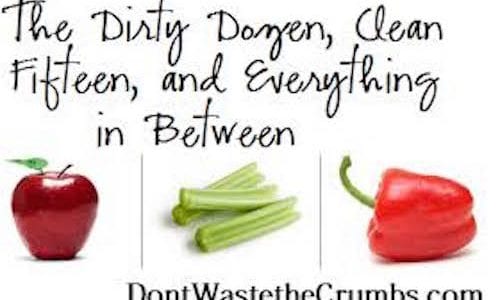

Nutrition’s Clean 15
LEVELUP INSIDERSUncategorized December 14, 2017 Jill Daniels 0

Have you heard of nutrition’s “Clean 15”? Most athletes know that fruits and vegetables contain key nutrients to help them grow, recover and stay healthy. Produce has a high water content that helps keep athletes hydrated Also many are rich in carbohydrates which are great choices for pre-workout meals, or for recovery meals when replenishing glycogen stores.
However, there is a downside to some of our produce choices. Many fruits and vegetables on the market have been treated with pesticides while in the field.
The Environmental Working Group puts out an annual guide on the 12 types of produce with the largest amount of pesticide residues — The Dirty Dozen, and the 15 types that have few, if any, pesticide residues – Nutrition’s “Clean 15”. As a result, EWG recommends purchasing the Dirty Dozen produce in organic form to reduce the exposure to pesticide residues.
_______________________________
CONNECT WITH US:
Follow SportStars on Twitter & Instagram | Like us on Facebook | Subscribe!
_______________________________
If buying organic is not an option, whether it’s due to unavailability or budget, this guide can be helpful for choosing foods lower in pesticide residues. With this guide, you can receive the health benefits of a diet high in fruits and veggies. And also limit your exposure to pesticides.
Here is EWG’s 2017 shopper’s guide to pesticides in produce:
Dirty Dozen — These are the fruits and veggies that are most commonly contaminated. Consequently you’d be better off buying organic; strawberries, spinach, nectarines, apples, peaches, pears, cherries, grapes, celery, tomatoes, sweet bell peppers and potatoes.
Nutrition’s Clean 15 — These are the least contaminated, and you’ll be fine buying either organic or non-organic; sweet corn, avocado, pineapple, cabbage, onions, sweet peas (frozen), papaya, asparagus, mango, eggplant, honeydew melon, kiwi, cantaloupe, cauliflower and grapefruit.
Don’t let the idea of pesticides deter you from eating an abundance of produce. The benefits of a diet high in fruits and vegetables outweigh the risks of pesticide exposure. According to EWG, “eating conventionally grown produce is far better than skipping fruits and vegetables.”
So remember, fruits and veggies are rich in a variety of vitamins and minerals. They can benefit an athlete in many ways; energy production, muscle contraction, strengthening the immune system and reducing inflammation. If you have the opportunity and budget to purchase organic produce, go for it. If not, taking in an abundance of conventional fruits and veggies will far outweigh any risks. ϑ
Maximize your athletic performance by seeking personalized advice from Nutrition Coach Jill Daniels, MS, RD, CSSD,
Certified Specialist in Sports Dietetics. www.JillDanielsRD.com
Image courtesy of http://dontwastethecrumbs.com/









No comments so far.
Be first to leave comment below.